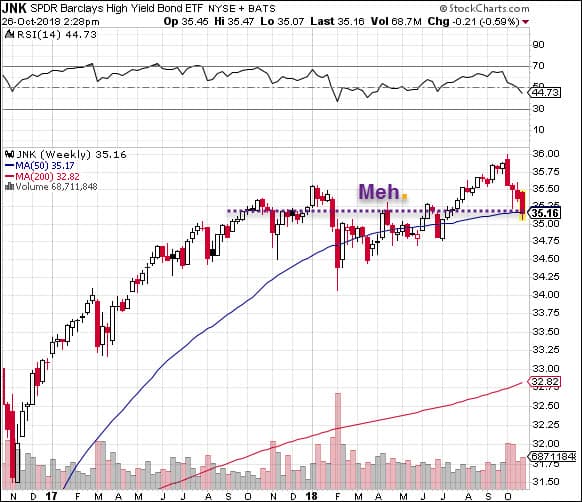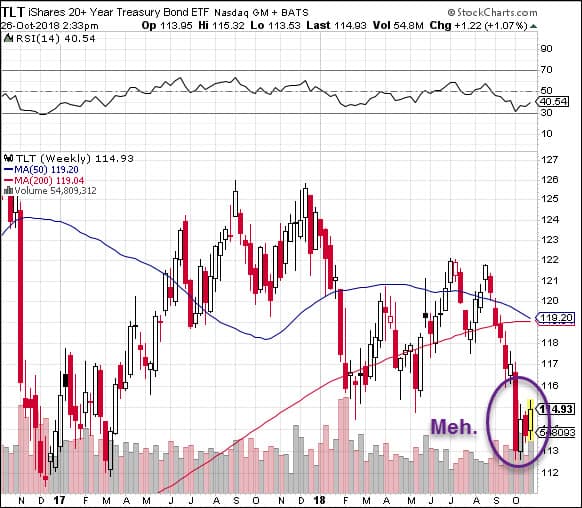I admit: I'm a permabear.
This is no surprise to those who know and have followed me over the years. But I'm publicly proclaiming my 'bearishness' because doing so might open up a needed and long overdue dialog.
Here's my fundamental position: Infinite growth on a finite planet is impossible.
Cutting to the chase, this is why I predict a major crash/collapse across stocks, bonds and real estate is on the way.
The recent market weakness seen over the past two weeks is nothing compared to what's in store. As we’ve been carefully chronicling, bubbles burst from ‘the outside in’, starting at the weaker places at the periphery before progressing to the center.
Emerging market equities are now down -26% from their January highs and -18% year-to-date. China's stock market is down -32%, even with substantial intervention by the government to prop things up.
The periphery has been weakening all year, and the contagion has now spead worldwide.
Taken as a whole, global equities have shed some $13 trillion of market capitalization for a -15% decline:
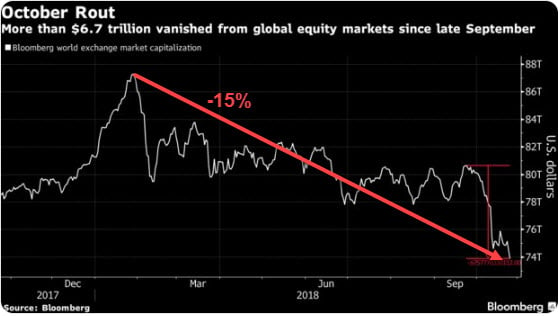
The rot has spread to the core with surprising speed. Now even the formerly bullet-proof US equity markets are stumbling.
The S&P 500 is now negative on the year:
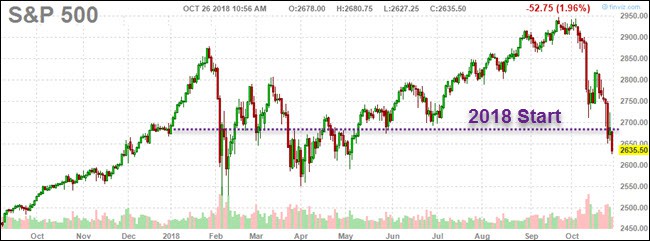
It’s been obvious for a long time to those who have watched The Crash Course that endless growth is simply not possible. Not for a bacteria colony in a petrie dish, not for an economy, not for any species on the planet. Eventually, when finite resources are involved, limits matter.
But the vast majority of society pretends as if this isn't true.
The US government is (and has been for decades) adding to its massive pile of debt at a rate far faster than it's income (GDP) is growing. Pension managers have a horizon measued in decades, and yet they buy stocks and bonds that can only pay off if endless growth occurs (e.g., 100+ P/E ratios). Much of today's buildings and public works will need to be rebuilt/replaced within the next 50 years, yet no one is certain whether we'll have enough affordable energy to do so.
In regards to the financial markets specifically, history has given us clear lessons to heed. 1929, 1987, 2001 and 2008 each showed us that when the world gets so manic that investors must believe in perpetual perfection/endless growth to justify current asset prices, a painful correction ensues as the limits of reality re-assert themselves.
Bulls vs. Bears
My permabear-ishness is a by-product of peering into the future and not being able to align society's hopes with what I see as the current trajectory of the world.
As a baby boomer, this sets me apart somewhat from my age cohort, many of whom have benefitted as our generation has lived beyond its means. But it’s not all unusual to find young adults, peering ahead into a diminished future, who share my views.
So when I look at today's markets, I ask: What’s the purpose or point of investing in financial assets that, by definition, depend upon a logical fallacy (endless growth) being true? None at all.
Now, in the short term, if you believe yourself to be smarter and more nimble than the rest, maybe you can find advantage in speculating over the short term. (And good luck with that, by the way...)
But for the average person? Is parking money in a 401k in a general index fund(s), crossing one’s fingers and hoping that the next twenty years will behave like the last twenty a good bet? Not if sustained economic growth continues to remain elusive the way it has since the 2008 crisis.
The Bull Trap
By definition, stock market bulls believe in growth, specifically endless growth. They believe, over time, the markets will head ever upwards.
As I’ve said I don’t believe that endless growth is possible. But more than that, I think, were it possible, it would be harmful to humans and planetary life in general.
I used to believe in growth. In my early career as a consultant, I even helped companies chase it. But as I became more familiar with the scientific data and connected a few dots, I realized my views regarding growth were naive. And in some cases entirely backwards.
For instance: In my MBA courses, I was taught that at a high enough price, new supply will always emerge to meet the market demand.
But a tiny bit of inquiry quickly reveals that the economy doesn’t deliver resources, instead we have an economy because there are natural resources to use. No resources, no economy. The economy is a subset of the natural world, not the other way around.
Most people get that intuitively, but it remains a mystery why so many stumble on the idea that ever more economic growth requires ever more resources. They ignore the reality that, at some point, resource limits matter.
And within the resource story, energy is THE master resource. No energy and you can’t have anything else. No economy. Nothing.
Even more precisely, surplus energy (also called "net energy") is what powers everything you and I hold dear about our amazing, just-in-time, global lifestyle. If a Cheetah expends more calories hunting than it actually catches, it dies. Every organism only thrives if it has a surplus of chemical energy compared to what it expends.
Simply put, humans are using up hundreds of millions of years of stored ancient sunlight (via fossil fuels) in the equivalent of a geological microsecond. It's been a one-time-only bonanza for our species. One that is fast approaching it's end.
Hey, it’s been fun. And we’re doing some really cool things with all that surplus fossil energy, like space travel and smart phones. But one thing we haven't done is invest for a future that will function when all that tasty surplus fossil energy is gone.
And as we've often written about, the ramifications are already beginning to be felt, and will only get worse over the coming decades.
A critical factor is that our system for running the world is becoming increasingly unstable. As surplus energy decreases, we are using more and more debt to pull tomorrow's prosperity into today to keep the party going.
But that can't last forever. And as 2008 showed us, when the debt stops growing, even briefly, the whole system shudders to a stop. Our current system of credit/money is either expanding or threatening to collapse. It no longer has a middle ground:
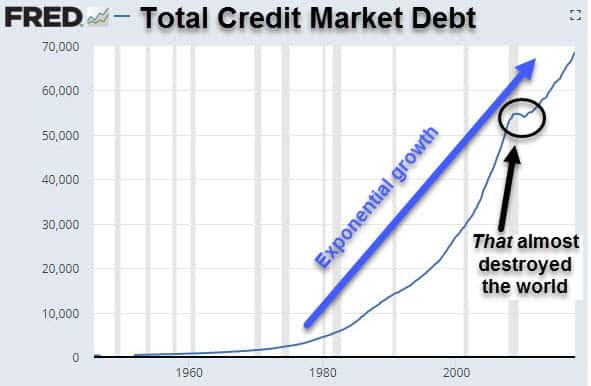
The Social Fabric Is Starting To Rend
This idea of growth being dependent on surplus energy is not a very difficult train of logic to follow. But as I’ve learned the hard way when delivering this message over the years, data and logic rarely changes people's behavoir.
People's actions are governed by their beliefs, which are stubbornly housed in our brain's emotional limbic system, not in the more rational cortex. When beliefs get challenged, emotions flare up. Data is irrelevant. Logic doesn’t matter. The backfire effect mushrooms and takes over.
We are now at the most important inflection point in all of human history, yet practically nobody knows about it. But try to raise people's awareness and – wow – does it ever challenge their belief systems. Fear and anger are the first emotions to get triggered, and listeners quickly search for any reason to reject the information.
This is wack-job conspiracy theory! This is failed Malthusian claptrap! This is fear-mongering! You're underestimating human ingenuity! If this were really true, I'd be reading about it in the media!
Over the years, I've heard thousands of these 'reasons' to reject looking critically at the data. It no longer bothers me, as I recognize it for what it truly is: an attempt to protect oneself from having to grapple with the possibility that the promise of endless growth, which our current prosperity is based on, just might not be real.
And I think many folks are nevertheless becoming aware of this on a subconcious level. It's that feeling in our gut we get when we see the 1% live so much better than the rest of us 99%. When we hear how "great" the employment rate is or the stock market is, yet we see so many households struggling to get by as the middle class get squeezed harder and harder between stagnant wages and the rising cost of living. When we see those who run our country and its corporations live by a different, more preferential, set of rules than the public is held to.
I think this explains why tensions and tempers are so high right now, even though very few seem to understand why. It explains why the country is so divided and increasingly desperate. It explains the hyper-partisanship, the turn to opioids, the pipe bombs.
To my way of thinking, a lot of the emotional energy being expended right now is due to the fact that our entire way of being is busy collapsing all around us. Our main narrative of “how life works” is breaking down. This is resuting in an epidemic of grief, depression, anger and sorrow.
(Personal note: If you're near Turners Falls MA on November 6th, 2018 I and a number of other PP members will be attending Stephen Jenkinson’s Nights of Grief & Mystery Tour, which delves into coping strategies for dealing with these emotions head-on. If you want to join us, send an email here).
Is The Crash Upon Us?
So with the wipeout of all 2018's market gains this week, is the next crash upon us? Is the financial system in the process of breaking down, as it did in 2008?
There are a number of indicators we watch closely here at Peak Prosperity. While many are showing signs of distress, we're not yet seeing the kind of systemic arrest we'd expect to see preceding a market seisure.
For instance, even as equities have pulled back, the weakest credit element, here represented by the ETF “JNK” that tracks junk bonds, has barely even budged during the current sell-off:
What tipped me off as a pre-indicator of the 2008 crash was the movement in both the credit markets and the financial companies most dependent on them. Remember, "stocks are for show but bonds are for dough". The serious money playing in the bond market typcially seeks safety before the more risk-loving players in the equity markets catch on.
Similarly, the prices for 'safe haven' US Treasury hasn't rallied by all that much. If there were a panic brewing, we'd expect to see these spiking more violently, even with China beginning to sell their stash and the Fed pulling back:
That “bounce” doesn’t even bring US 20-year bonds back to even for the month of October, let alone return them to where they were in September.
Similarly, gold hasn't rallied that much either in US dollar terms (in euros and yuan is another matter):
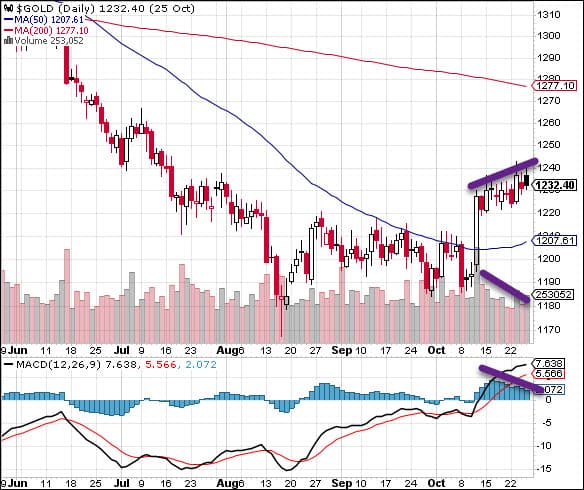
Add to the above that the US economy is not (yet) in recession, and a full-blown crash looks unlikely to unfold before us right now.
BUT, what we are seeing in the markets is exactly the kind of precusor activity we would expect to see in the final stage leading up to a crash.
In Part 2: How Close?, we lay out the indicators we're watching most closely and what they're currently forecasting about the timing of a major market breakdown, as well as reinforce the importance of prudently preparing yourself *now*.
This equity correction has my full attention. No, I don’t think it’s the big one (yet). But, yes, I think the big one is not far behind
In the immediate here and now, focus on getting yourself prepared as best as you can and remain above the emotional fray that's tormenting so many people. It's only going to get worse from here.
Click here to read Part 2 of this report (free executive summary, enrollment required for full access
This is a companion discussion topic for the original entry at https://peakprosperity.com/is-the-long-anticipated-crash-now-upon-us/
